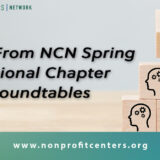Lessons Learned on 1st Floor Retail in a Shared Space
I was recently working with NCN on a feasibility study and was asked to look into 1st floor retail options in a shared space environment. While I didn’t have experience with this when working at Deschutes Children’s Foundation, I have always thought the idea of having some retail in a shared space center could be beneficial particularly in regards to an additional revenue stream. In my research, I found there to be many benefits to this type of model, in addition to some drawbacks – and my assumption of it being a revenue stream for the shared space operator proved to be wrong. With this knowledge, I thought it might helpful to provide you with a few of the lessons learned from the organizations I was able to connect with regarding 1st floor retail.
- Relationships are KEY: As with anything we do in the nonprofit sector, relationships should always be at the forefront. It doesn’t matter if the retail operation is a café, a gift shop, or a real estate office, a strong relationship between management of the shared space and the retail operation is essential and must be built on trust. I found that most of the relationships were solid which I believe was in part due to having the business as a tenant just like the other organizations. One message I heard a few times was to “let the experts operate the retail”!
- Great Value-Add: Having a retail operation on site can be a great value add to the tenants, particularly if it is a café. Having a space where people can congregate, collaborate, and have interaction with the greater community can help the tenants increase their networks and provide a natural setting for resource sharing and collaboration. It can also provide a great opportunity for the community to learn about the nonprofits and possible services in the shared space. As one member noted, it makes the entire space feel more “activated”. Another member said they enjoyed the mix and that it felt like they were “creating a village” with a diverse mix of for-profit, non-profit, commercial, retail, and industry. Another value-add could be onsite catering for meetings and events as well as possible discounts for employees of the shared space.
- Consider Location: The location of the shared space building with a retail component must be where the community is. For example, if you have a café in your shared space building, but it is in an area that is hard to find, hard to get to, and doesn’t have the foot traffic, people will not go the café. It will be there solely for the purpose of the tenants, which isn’t necessarily a bad thing, but is it a sustainable business for the retail operator? Likely not. However, one location I talked with has a café and said it was really nice to have due to the lack of nearby eating options and that it worked because the center was large enough to support it.
- Mission Related: This is the icing on the cake! One organization that houses many sustainability-focused organizations has a café that is managed by a catering company and provides farm to table food, organics and interesting menus. Other opportunities to consider is if there is a tenant that has an social enterprise component to their organization, perhaps it is one that could be made available to the community at large by co-locating its operations within the shared space. A few examples that come to mind are art galleries and bookstores.
A few drawbacks included occasional visitor confusion, restaurant odors, noise and security issues, and having to accommodate retail or restaurant hours for weekends and holidays. However, I found that the benefits truly outweigh the drawbacks if the relationship and agreement between the business and the shared space operator was designed to be beneficial for all involved.
Thank you to the Alliance Center, The Chicago Literacy Alliance, Tides Thoreau Center, and urbanspace property group for their responses. I am sure you can reach out to them for further questions, or feel free to email me at kimmcnamer@gmail.com.








One comment
Pam Mauk
June 20, 2017 at 10:10 am
I assume the retail does not provide additional income stream because their margin is so slim? We charge below market lease rate on our campus, so I have assumed we might charge more of a market rate (thus reaping some benefits) if we had a cafe in some future iteration of Together Center.
I enjoyed your article, Kim, and am happy to learn of your new role. Congratulations on the fun adventure you have coming up.